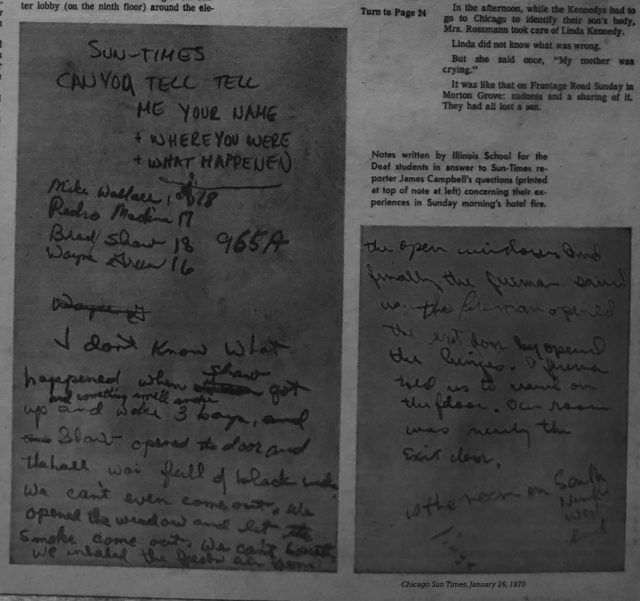This article originally appeared at i711.com.
A group of disabled people filed a civil lawsuit, citing the state Constitution and the Americans with Disabilities Act, on Nov. 22 against the Massachusetts House and Senate leaders for failing to provide access to State House events. Among the litigants are three deaf community leaders: John Pirone, Louis Rivas, and David DelPizzo.
Part of the lawsuit asks for increased interpreter availability, closed captioned House and Senate proceedings on a local channel, awareness, and some financial compensation. Although the lawsuit includes problems experienced by individuals with other types of disabilities, I’m more interested in what the deaf plaintiffs dealt with.
In March 2006, Pirone, the executive director of the Massachusetts State Association of the Deaf (MSAD), attended a hearing about the provision of CapTel services. Even though he had been told that an interpreter and CART services would be available, Pirone arrived to find only the captioner there. John could keep up with what was said thanks to CART, but couldn’t voice for himself in spoken English without the interpreter. During the meeting, the legislators asked Pirone to make a few comments, but he couldn’t without the voice interpreters. To add insult to injury, the captions were shown only on a laptop screen, forcing the people there to crowd around the laptop to read the proceedings.
The lawsuit states, “It was important to plaintiff Pirone personally, and in his representative capacity as Executive Director of the Massachusetts State Association for the Deaf, to voice the concerns and interests of the members of his organization and to communicate what transpired at the hearing to his members.” It also stated, “The lack of provision of communication auxiliary aids at the hearing… prevented plaintiff Pirone from fulfilling his goals and responsibilities of testifying before the Committee, responding to questions from the Committee members, and communicating what transpired at the hearing to his constituents…”
Having to stand up and not being able to even say, “I can’t voice for myself because I don’t have an interpreter,” is embarrassing enough. But there’s more.
A Dec. 6 Massachusetts State House News Service article reported that lawmakers “rolled their eyes when asked about the March hearing of the Joint Committee on Telecommunications, Utility and Energy, when John Pirone, the deaf director of the Massachusetts State Association of the Deaf, could not respond to questions or relay to his constituents what happened.”
Rolled their eyes?
The article also said that legislators have been ordered not to speak about this case, noting, “The counsels of both chambers told members and aides in a Nov. 29 email, obtained by the News Service, that they believed the suit was ‘groundless,’ but asked them to check in with the lawyers’ offices before ‘communicating’ with the litigants or their advocates.”
Groundless? Really?
The other deaf plaintiffs, DelPizzo and Rivas, repeatedly requested interpreters for an April 2006 budget hearing for the Massachusetts Commission for the Deaf and Hard of Hearing (MCDHH), and were under the belief that interpreters would be provided. But when they arrived – does this sound familiar yet? – there were none. The lawsuit lists many other situations where accommodations were not provided, even with advance requests.
Did I also mention that this continued failure to provide interpreters had been going on for 20 months at least? Yes. 20 months.
The deaf litigants met with leaders at the House and Senate to discuss various accessibility solutions, but nothing allegedly was put in action for 20 months. I don’t agree that litigation is always the best step to take, but sometimes a lawsuit is the only way to get a situation resolved.
Currently, there is no formal procedure in the Massachusetts legislative system for communication accessibility. The article, written by Jim O’Sullivan, also reported that Senate President Robert Travaglini was “surprised” by the lawsuit, adding that he said, “We’ve tried to demonstrate that we were serious about recognizing our responsibility to remedy those conditions, and we’re doing the best we can.”
How interesting. The right to be part of a democracy is at the very crux of the U.S. Constitution. To roll their eyes when someone asks for this right is not “doing the best” they can, nor is denying people, deaf or hearing, full access to participation in the political process.
The legal complaint may be viewed by visiting www.dpcma.org, clicking on Accessibility/Civil Rights Compliance, then clicking on Download Accessibility/Civil Rights Compliance Documents.
Copyrighted material. This article can not be copied, reproduced, or redistributed without the express written consent of the author.




